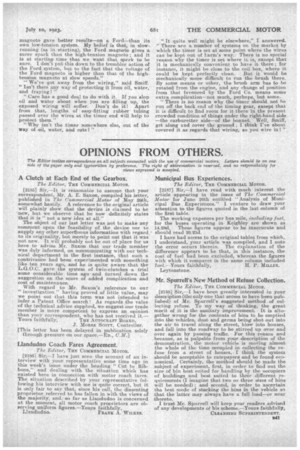OPINIONS FROM OTHERS.
Page 25

If you've noticed an error in this article please click here to report it so we can fix it.
Tho Editor invites correspondence on alt subjects connected with the use of commercial motors, Letters should he on MO side of the paper only and typewritten by preference. The right of abbreviation is reserved, and no resTonsibi/ity for views expressed is accepted.
A Clutch at Each End of the Gearbox.
The Editor, THE COMMERCIAL MOTOR.
[2185] is reasonable to assume that your
correspondent, Mr. A. E. Saxon, compiled his letter, published in The Commercial Motor of May 2.Stth, somewhat hastily. A reference to the original article will plainly show that the device is claimed to be
• new, but we observe that he now definitely states that it is " not a new idea at all."
The object of our last letter was not to make any comment. upon the feasibility of the device nor to supply any other superfluous information with regard to its originality, but merely to point out that it was not new. it will probably not be out of place for -us here to advise Mr. Saxon that our trade member was duly informed, On communicating with our technical department in the first instance, that such a contrivance had been experimented with something like ten years ago, and he is quite aware that the L.G.O.C. gave the system of twin-clutches a triad HODIC considerable time ago • and turned down the suggestion on the score of added complication and cost of maintenance.
With regard to Mr. Saxon's reference to our " investigation " having proved of little value, may we point out that this term was not intended to infer a Patent Office search! As regards the value of the technical advice supplied, we suggest our trade member is more competent to express an opinion than your correspondent, who has not received it.—
Yours faithfully, THE AITTOCRAFT BOARD, 3. MORSE SCOTT, Controller. [This letter has been delayed in publication solely through pressure on our space.—ED., (LH.]
Llandudno Coach Fares Agreement.
The Editor, THE COMMERCIAL MOTOR.
[21861 Sir;—I have just seen the account of an interview with your representative some time ago in this week's issue under the heading " Cut to Ribbons," and dealing with the situation which has existed here in connection with motor coach fares. The situation described by your representative following his interview with me is quite correct, but it is only fair to say that, since his call, the dissenting proprietor referred to has fallen in with the views of the majority, and, so far as Llandudno is concerned at the moment, all motor coach proprietors are observing uniform figures.—Yours faithfully, Llandudno. FRANK A. WILKES.
Municipal Bus Experiences. ,
The Editor, THE COMMERCIAL MOTOR.
[2187] Sir,—I have read with much interest the article appearing in the issue of The Commercial Motor for June 26th entitled "Analysis of Municipal Bus Experiences." I venture to draw your attention to the figures quoted in the last column of the first table.
The working expenses per bus mile, including fuel, for the buses operating in KeighIey are shown as 14.28d. Those figures appear to be inaccurate and should read 20.23d.
I have had access to the original tables from which,
understand, your article was compiled, and I note the error occurs therein. The explanation of the difference appears to be that, in this instance', the cost of fuel had been excluded, whereas the figures with which it compares in the same column included fuel.Yours faithfully, H. P. MILLER. Leytonstone.
Mr. Spurrelts New Method of Refuse Collection.
The Editor, THE COMMERCIAL MOTOR.
[2188] Sir,—I have been greatly interested in your description (the only one that seems to have been pubdished) of Mr. Spurrell's suggested method of collecting refuse. To my way or thinking, the great merit of it is the sanitary improvement. It is altogether wrong for the contents of bins to he emptied into the vehicles, dust and germs being shot out into the air to travel along the street, blow into houses, and fall into the roadway to be stirred up over and over again by passing traffic. For this reason and because, as is palpable from your description of the demonstration, the motor vehicle is moving almost the whole of tho time occupied in collecting the refuse from a street of houses, I think the system should be acceptable to ratepayers} and be found coorico-deal. Certainly, the method should be made the subject of experiment, first, in order to find out the size of bin best suited for handling by the occupiers of buildiRgs and hest suited to their different requirements (I imagine that two or three sizes of bins will he needed): and second, in order to ascertain the best mode of stacking the bins in the vehicle so that the latter may always have a full load—or near thereto.
I trust MrSpurred} will keep your readers advised of any develepments of his scheme.—Yours faithfully, CLEANSING SUPERINTENDENT.




























